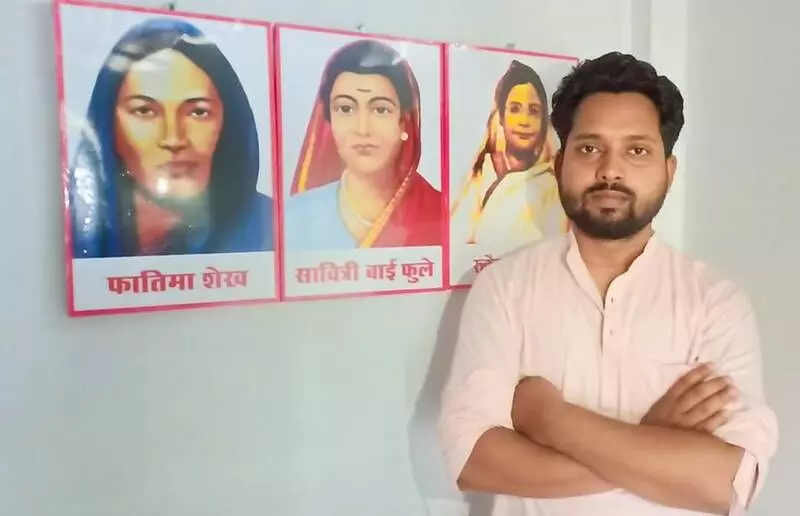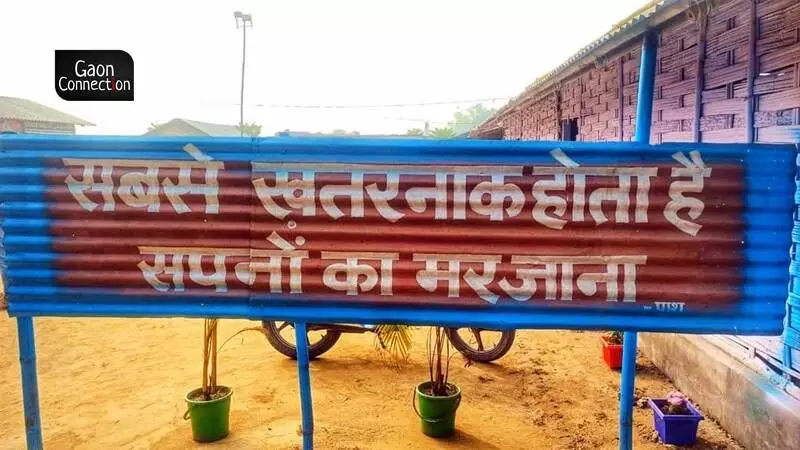Shyam of Halda village has never been to school. But these days the 15-year-old daily visits Savitri Bai Phule library at 1 PM and stays on till 4 PM, and then leaves to graze his buffaloes. The library, which was started in June 2021, is located walking distance from his village in Kishanganj district of Bihar.
Like Shyam, 80 odd children from the neighbouring villages frequent this library and 40 of these kids do not go to any school. These children are taught at the library by Saquib Ahmed, who is instrumental in establishing libraries in villages of Kishanganj and also holding book fairs across the district.
Ahmed, who is the founder of Seemanchal Library Foundation, quit his job in Delhi in 2021, and returned home to Kishanganj and since then has set up three rural libraries in his district.
The first library to be opened was the Fatima Sheikh Library, in Damalbadi village in Pothia block, in January 2021. The second library was the Savitri Bai Phule library opened in Belwa village in the same block in June 2021, and the third one was the Rukaiyya Sakhawat library at Janta Kanhaiya Badi village in Kochadhaman block in September 2021.
Also Read: Keeping Education on Track
There are about 4,000 books in these three libraries and 200 children visit them every day. Most of them are from Dalit communities and children of daily wage labourers. Many of them work in the fields all day before coming to the libraries to read and learn.

Children who come to the library have begun to ask questions, debate, and discuss issues the world faces. In photo, Saquib Ahmed.
“Unbelievable as it may sound, the people in these villages did not even know what a library was. But now things are very different,” Ahmed, who has studied till class 12 only, told Gaon Connection.
“I had no desire to study further. Academics disillusioned me, but I had an insatiable curiosity about the world,” the 27-year-old, added. His love for literature fuelled his determination to spread love for books amongst the children through libraries in his hometown and surrounding villages.
Also Read: A police thana turns into a centre for learning for rural children in Panna, MP
According to NITI Aayog’s 2021 report, Kishanganj is Bihar’s poorest district with 64.75 per cent of its population living below the poverty line. And, it is in this environment that Ahmed is forging ahead with his dream of setting up libraries in every village in the district to spread education among rural children.
He recalled the beginnings of the Seemanchal Library Foundation. “Five or six of us had formed a literary group where we would discuss poetry. We wanted to expand our discussion and so we went to book shops in the bigger cities elsewhere to look for more books of verse,” Ahmed said. But to their horror, all they found were collections of vulgar verse and booksellers who had not even heard the names of Ghalib or Faiz.
“We came to know that there was not one bookshop of any merit in the entire district. That is when we decided to open a library. Today there are three libraries in Kishanganj,” Saquib said with pride.
The library mission began with the books being housed in thatched mud buildings. But in January 2021, Varun Grover, writer and lyricist made a video where he appealed to people to support this library movement “Many people responded by joining our mission and proper libraries were set up,” Aaquib Raja who looks after the Savitri Bai Phule library told Gaon Connection.
Also Read: A black umbrella, an LED TV and bagless education — a primary govt teacher in Bilaspur drives change
Centres of learning
The libraries are not just for collection of books. They have also become centres of learning and training for many of the children. “Just recently we organised a multimedia film screening workshop. We also organised book exhibitions in various places too. Introducing children to the books further strengthens our mission to spread literacy and love for reading,” Ahmed said.
Of the 80 odd children who come to the Savitri Bai Phule library, 40 do not go to any school. These children are taught at the library. “Our aim is to ensure these 40 children also start going to the government school here,” Ahmed said.
According to him, children who come to the library have begun to ask questions, debate, and discuss issues the world faces.
Ayesha Siddiqui, a 15-year-old demanded to know why society was so patriarchal; 13-year-old Dulari Kumari who is from a Dalit family asked if equality that is promised in the Constitution really applied to everyone; 15-year-old Bharathi Kumari wondered if they would have remained ‘untouchables’ had Baba Saheb Ambedkar had not been there.
For sisters Kiran and Suman, 17 and 16 years old respectively, it was an eye opener learning that art can also be a part of education. “Along with the regular lessons, poetry is also read to us. We are encouraged to paint…,” Kiran told Gaon Connection. “We started going to the library to just pass time, but now we are regulars,” Suman added.
Support the rural libraries
While the libraries are providing a window to the outside world for the children who would have otherwise remained ignorant, sadly, there is no visible support being extended by local intellectuals, or the people’s representatives, regretted Ahmed.
“We have not approached any local leaders for help, but we did approach some government school to allow us to display our books for the students there, but nothing came of it,” he pointed out. For Ahmed and his friends, keeping the libraries alive and running in 2023 is going to present a big challenge. “If we are successful in raising support and funds, we will take our mission to every corner of Seemanchal,” Ahmed declared.
There is no support from society, from the educated classes for the library movement, regretted Saquib. “It is the spark in the eyes of the children who come here after they have slogged all day, that lends the strength to our library movement,” he added.

According to NITI Aayog’s 2021 report, Kishanganj is Bihar’s poorest district with 64.75 per cent of its population living below the poverty line.
Raja informed that the Rukaiyya Sakhawat library was closed for the time being. “It functions from a private coaching centre and because the centre needed to be reused as a classroom for the students, the library activities had to be suspended,” Raja told Gaon Connection. Because of shortage of funds, the books at this library do not have a home of their own, he added.
Ghulam Yajdani, one of the co-founders of the library movement, said that many people visited the libraries out of curiosity. “Children and visitors from outside visit us. I am thrilled because even becoming an object of tourist curiosity lends strength to the movement,” he told Gaon Connection.
“In a backward area like Kishanganj, with such limited resources, the movement has taken hold. If only there is financial help extended to it, then the movement will really go places,” he concluded.




















